
Feature Articles
1. Food Safety Electronic Information Delivery System

Hello everybody! With the rapid development of food science and technology as well as the increasing complexity of food production in recent years, consumers are increasingly concerned about the safety of food products.
The Centre for Food Safety (CFS) of the Food and Environmental Hygiene Department (FEHD) is the food safety authority in Hong Kong . It is committed to safeguarding public health through enhancing food safety. People from various sectors are important partners in striving for that goal.
FEHD established the Food Safety and Pest Control Electronic Information Delivery System (FSPCEIDS) in early 2005. The objectives are to provide registered medical practitioners with updated information on food safety and pest control issues; assist them in offering professional advice to patients; and promote food safety and pest control messages to the public through conjoint effort.
To strengthen partnership with the food trade, the CFS, after its inception this year, has set up a Food Safety Electronic Information Delivery System (FSEIDS) for members of the trade and individuals interested. This system provides the latest information on food safety issues, enabling the CFS to collaborate with the food trade in promoting food safety messages to the public. Members of the food trade will receive information on food safety such as announcement on important public health issues, food risk assessment reports and food surveillance programme results. To ensure rapid information transfer, information of FSEIDS will be disseminated by e-mail. The service is free of charge.
The CFS has sent invitation letters to members of the food trade to invite them to enroll as FSEIDS users. The system was officially launched on 1 August 2006. The CFS will work closely with the food trade to further enhance the food safety in Hong Kong.
For enquiries, please contact the CFS on 2867 5698 or by e-mail to fseids@fehd.gov.hk.
2. Guidelines on Voluntary Labelling of Genetically Modified Food
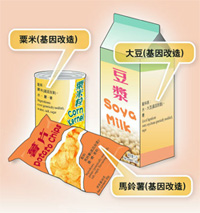
To enhance consumers' knowledge and help them make informed choice on genetically modified (GM) food, the Centre for Food Safety has issued in July Guidelines on Voluntary Labelling of Genetically Modified Food which serves as a reference for the trade to make truthful and informative labels in a consumer-friendly manner.
The Guidelines are formulated by the working group on voluntary labelling of GM food comprising representatives from the food trade, consumer bodies and various government departments. Although the Guidelines are advisory in nature and have no legal power, the trade could proactively adopt the Guidelines to standardise the information provided to consumers.
Four Basic Principles of the Guidelines
Principle 1: Labelling of GM Food should comply with the Laws of Hong Kong.
Principle 2: The threshold level currently applied in the Guidelines for labelling purpose is 5%, in respect of individual food ingredient, taking account of adventitious mixing of GM and non-GM crops during harvest, transportation, processing and storage. This threshold level reflects a pragmatic and realistic level that the trade can achieve at the current stage.
Principle 3: Additional declaration on the food label is recommended when significant modifications have taken place under the following conditions:–
- the composition or nutritional value is significantly different from that of its conventional counterpart;
- the level of anti-nutritional factors or natural toxicants is significantly different from that in its conventional counterpart;
- the presence of an allergen that is not found in its conventional counterpart;
- the intended use of the food is significantly different from that of its conventional counterpart; or
- an animal gene has been introduced into food of plant origin.
Principle 4: Negative labelling to indicate that the food or its ingredients is from non-GM sources is not recommended for food without GM counterparts as it would be misleading to consumers.
How to label GM Food
It is recommended in the Guidelines that any prepackaged food items with 5% or more GM materials in their respective food ingredient(s) could be labelled as "genetically modified" in brackets following the name of the food/ food ingredient in the "List of Ingredients" or in a prominently displayed footnote to the "List of ingredients". For any GM food with significant modifications that have taken place (Please refer to Principle 3), additional information about the changed characteristics are recommended to be provided in conjunction with the name of the food or food ingredients.
The recommended formats for labelling are shown below:
List of Ingredients: water, soya beans (genetically modified), sugar
Or
List of Ingredients: water, soya beans*, sugar* genetically modified
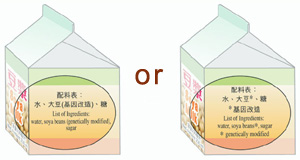
How to Label Non-GM Food
Under the current legislation, members of the trade should not falsely describe their food products. Since there is possibility of unintentional mixing of GM and non-GM crops, a truly "GM free" status is very difficult to attain. Therefore, absolute terms such as "GM free", "GMO free", "free from GM ingredients" and similar labels are not recommended as such absolute terms would be misleading to consumers.
If a food product is labelled as non-GM or other similar declarations, the trade needs to have documentation to substantiate that their product is made from non-GM source, or all ingredients in the product are derived from non-GM sources for those products containing multiple ingredients.
For further information about the Guidelines and GM food, please visit the website of the Centre for Food Safety at www.cfs.gov.hk.
Food Safety Plan Corner
Food Safety Guidelines on Catering Services for the Elderly
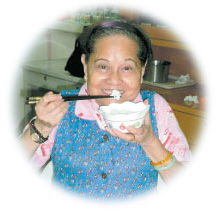
Many organizations provide catering services for the elderly. As many foods are included and the elderly are generally weaker in body resistance, food handlers should pay attention to and prevent possible risks when preparing meals for them.
Key points to note when preparing meals for the elderly:
- When planning the menu, ensure that the ingredients needed and facilities such as stoves, refrigerators and hot-holding equipment are available;
- Keep raw and cooked foods in separate refrigerators. If they are stored in the same refrigerator, put cooked foods above raw ones to prevent cross-contamination;
- Cook all the foods thoroughly. Use a thermometer to ensure that the core temperature of food has reached 75°C or above;
- Adopt the "cook-and-serve" system to shorten food preparation time as far as practicable;
- Carefully handle cooked foods that need further processing after cooking (e.g. blending food into a smooth puree);
- Clean and sanitize all food contact surfaces thoroughly (especially blenders for cooked food and feeding spoons);
- For meal delivery to the elderly, foods should be put in insulated containers (e.g. thermal lunch boxes) and kept at 60°C or above until they are ready for consumption, and shorten delivery time as far as practicable;
- Check the food temperature randomly before the meals are distributed on site or delivered to ensure the foods are kept at 60°C or above;
- Maintain good personal hygiene practices. Wash hands with liquid soap for at least 20 seconds before handling food or after using toilets;
- Advise the elderly to consume the meal as soon as possible and try to finish the food in one go.
Handling food complaints
Food complaints help to reflect problems that may be overlooked during food preparation. Caterers should respond promptly and positively:
- Have a contingency plan in place, including appointing a crisis manager to take immediate action in case of emergency;
- If problems are identified, advise the elderly to stop consumption immediately to prevent food incidents;
- Maintain the following records at all times for effective follow-up actions:
- Name list of the elderly who take meals daily, including the number of elderly, their addresses and the foods served, etc;
- Emergency contact numbers of the elderly's relatives;
- List of ingredient suppliers, and
- Daily purchase record.
- Caterers should provide their contact information such as telephone numbers and addresses at a prominent position on the food containers for the elderly and staff of the care homes/centres.
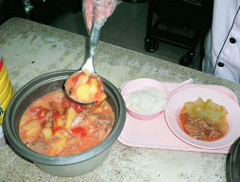
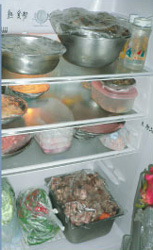
To safeguard food safety in the homes and services centres for the elderly, the Centre for Food Safety (CFS) and the Social Welfare Department, jointly organize a promotional programme in 2006 on food safety of catering services for the elderly for the officers-in-charge of these establishments and their staff. Through this programme, risk factors in preparing meals for the elderly will be analyzed and precautionary measures recommended in order to enhance food safety standard. Seminars will be held in different districts from September 2006 to January 2007. For enrolment or for more information, please contact the Risk Communication Section of the CFS on 2867 5610.
Readers' Corner
Food Safety Case Study
What is organic food?
Welcome to the "Readers' Corner". This is your host, the Food Safety Wunderkind. Recently, a reader wrote to us, asking what organic food is. I think many of you would like to know too. Let me tell you what in fact organic food is.
Organic food is different from conventional food mainly because it is produced according to organic standards throughout the production, processing and handling stages, and certified by a certification body or authority of the countries of origin. Organic standards include: *
- for planting, avoid using chemical pesticides and fertilizers, but emphasize crop rotation, animal and plant manures, hand weeding and biological pest control; *
- for raising animals, avoid using antibiotics, growth hormones and other animal feed additives; and *
- no application of genetic modification and ionizing radiation.
How to know if the food is organic?
that the waxy substance on the skin of apples may not be safe to eat.
Organic farming avoids using chemical pesticides and veterinary drugs, organic food products and therefore have less chemical residues. The labels on organic food products usually indicate that they have been certified as "organic" by a certification body or authority. Locally produced organic food is mainly vegetables. Processed organic food products such as dried beans, soya milk, breakfast cereals, cookies, etc. and organic animal products like eggs are imported for sale in Hong Kong.
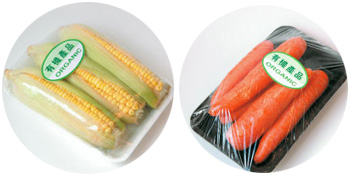
Advice to Consumers:
- From a nutritional point of view, there are no distinct differences between food produced according to organic standards and those by conventional method. The public should maintain a balanced diet, which includes fruit, vegetable, cereals, meat and milk, in order to obtain all the necessary nutrients for staying healthy.
- The general rules apply when purchasing organic products. For example, do not buy vegetables that look unfresh or mouldy.
- All food must be thoroughly washed and cooked.
FEHD has published a pamphlet on "Know more about organic food". Please visit the website at http://www.fehd.gov.hk/english/pestcontrol/library/organic_food/1.html.
Activity Highlights
1. Trade Consultation Forum

To strengthen co-operation with the trade and enhance food safety, the Centre for Food Safety (CFS) will regularly conduct Trade Consultation Forum. The Forum will provide a platform for the Government and food trade to exchange views on food safety matters and to collect the views and comment of food trade on risk communication initiatives. Issues on food safety control measures and standards will also be discussed to solicit the views of the trade.
The first Forum was held at Edinburgh Place in Central on 28 July 2006 . The agenda included introduction of the work of the CFS, briefing on risk analysis principles and Guidelines for Voluntary Labelling of Genetically Modified (GM) Food, discussions on food safety issues that are of major concern, such as the impact of avian influenza cases in neighbouring areas on the importation of live chickens, partial lifting of the suspension of imports of US beef, etc; and reporting on the risk communication work.
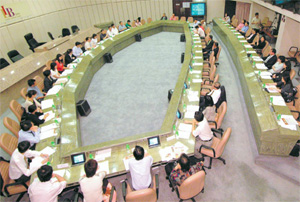
Food trade associations, major food processors, food importers and wholesalers, supermarket operators and retailers were invited to attend.
The next Forum is scheduled in early October 2006 at Edinburgh Place in Central. We look forward to your participation and continued support.
2. International Symposium on Food Safety
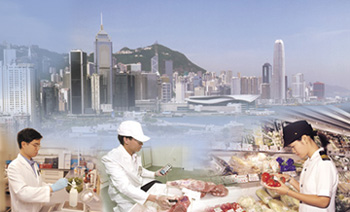
The International Symposium on Food Safety, organized by the Centre for Food Safety, will be held in January 2007. The objectives of the Symposium are to bring together the Mainland, international and local food safety professionals to share their experience and expertise on food safety management and control measures as well as to foster partnership and promote collaboration. Speakers will come from the Mainland, overseas and local food safety authorities and academic institutions.
| Date: | 12 and 13 January 2007 (Friday and Saturday) |
| Time: | 9 a.m. to 5 p.m. |
| Venue: | Kowloon Shangri-La Hotel, 64 Mody Road, Tsimshatsui, Kowloon , Hong Kong . |
| Fee: | HK$500 for two days |
| (per head) | HK$300 for one day |
| HK$200 for full-time students |
The Symposium will be conducted in English and Putonghua (with simultaneous interpretation).
Active participation of the trade will be indispensable to make the Symposium a success. We look forward to seeing you.
For more information about the Symposium and to download the registration form, please visit the website at http://www.cfs.gov.hk/symposium.html , or contact Swire Travel Ltd., the organizing agent, on 3151 8900, or by email at foodsafety2007@swiretravel.com .
Interpretation of Ordinance
Harmful Substances in Food Regulations
At present, the Public Health and Municipal Services Ordinance (Cap. 132) requires that the food for sale in Hong Kong shall be fit for human consumption while its subsidiary legislation, the Harmful Substances in Food Regulations (the Regulations) regulates the import and sale of food containing harmful substances. According to the Regulations, any person who imports, manufactures or sells, for human consumption, any food containing certain substances specified in the regulations in greater concentration than the specified maximum concentration commits an offence and is liable to a maximum fine of $ 50,000 and to imprisonment for 6 months.
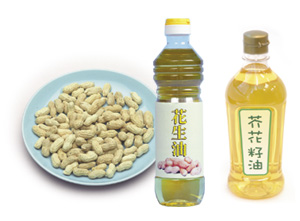
Section 3 of the Regulations stipulates that aflatoxin, erucic acid and malachite green are harmful substances. Any food other than peanut or its products shall contain no more than 15 micrograms of aflatoxin per kilogram of the food while peanuts or peanut products shall contain no more than 20 micrograms of aflatoxin per kilogram of the food.
Erucic acid is the main fatty acid of canola oil and other Brassicaceae seed oil. Tests on laboratory animals found that excessive intake of erucic acid may damage their heart tissue. Erucic acid in any food containing oil or fat (including food to which oil has been added) shall not exceed 5 per centum by weight of the total fatty acid content.
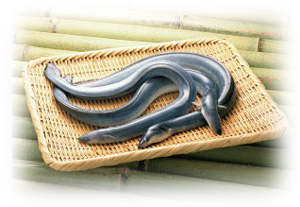
Malachite green has been included in the Regulations. All food for sale in Hong Kong shall not contain any malachite green.
Under the Regulations, any person who imports, manufactures or sells any food containing aflatoxin or erucic acid in greater concentration than that mentioned above, or any food containing malachite green (including live fish, live reptile and live poultry) commits an offence and is liable to a maximum fine of $ 50,000 and to imprisonment for 6 months.